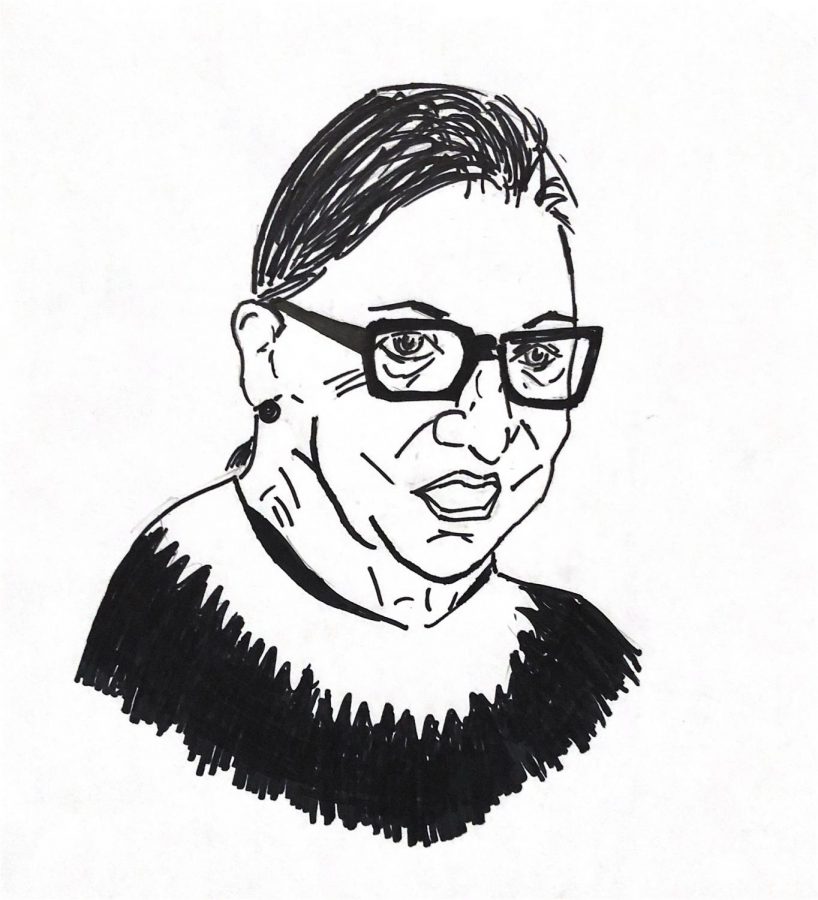Ruth Bader Ginsburg diagnosed with pancreatic cancer: now what?
October 5, 2019
The Supreme Court announced on Aug. 23 that 86-year-old Justice Ruth Bader Ginsburg underwent treatment for pancreatic cancer in New York City.
“The focused radiation treatment began on August 5 and was administered on an outpatient basis to treat a tumor on her pancreas…the Justice tolerated treatment well…the tumor was treated definitively and there is no evidence of disease elsewhere in the body” the Court provided in a statement. “Justice Ginsburg will continue to have periodic blood tests and scans. No further treatment is needed at this time.”
Despite fighting her fourth battle with cancer, Ginsburg told NPR reporter Nina Totenberg, “I think my work is what saved me because instead of dwelling on my physical discomforts, if I have an opinion to write or a brief to read, I know I’ve just got to get it done so I have to get over it.”
As only the second female supreme court justice, there is no denying that Ginsburg’s long list of accomplishments set her apart and make her an icon. “She was appointed by Bill Clinton in the 90’s. She serves as a really strong icon, particlaraily for women, especially in the areas of gender equality,” US History teacher Mr. Adam Bellows stated.
As Divya Mehrotra, a politically active student at Dougherty who worked on Elizabeth Warren’s campaign, emphasized, “she has … championed the Equal Rights Amendment … she has voted for legalizing same sex marriage. She’s against gerrymandering, she’s voted for gender equality initiatives, for abortion rights, she has a very big role in the supreme court as a liberal voice.”
Her icon status is also due to her bipartisan relationships and respect for working with others across the aisle.
Junior Abhipri Chowdury remarked that, “she battles many problems republicans refuse to look at.” Chowdury also remarked on her strong stance as a political figure. “ … Women [such as Ginsburg] … [have so] much influence over people and power to judge what is right versus wrong [in our country] … For women across the country, she is a really big mentor.”
In other words, if the US were to lose such an icon, the structure of the supreme court and society could swing drastically right and lose its balance.
The Supreme Court is the highest judiciary in the United States and has changed society and laws that affect people on a daily basis. For instance, Roe V. Wade, the hallmark court case that guarnettes a women’s right to an abortion, could be in danger with a conservative majority.
“The court [in many instances] has been viewed as a sort of an apolitical body, but it’s pretty obvious that it is not apolitical … people lean one way or another,” Bellows commented.
“I personally think that it is important to have somebody who has that background on the court and makes decisions for all of us and rules on whether things are constitutional … [it’s] essential for maintaining our civil liberties,” Bellows stated.
Because of the structure of the Supreme Court with nine justices, Ginsburg often acted as the swing vote on many essential issues.
Bellows emphasized, “I think she understands what it means for her to prove…that she can do this job within the confines of the requirements of the job.”
Known for her dissenting opinions, Mehrotra added that “her becoming incapacitated could mean a even more conservative majority on the court, which endangers abortion rights and other things … it scares me, especially knowing the country we live in.”
Mehrotra also elaborated on how she compares to John McCain, the late senator and prisoner of war. “We just saw John McCain … we saw how important of a figure he was. I think the scary thing is the fact that we could lose such an icon, who’s championed women’s rights, gender equality, who’s fought for people who don’t have voices. Losing that voice could be extremely detrimental.”
Although one can argue that that status as an icon could be helpful, such a position could actually contribute to the reverse.
“I like the fact that more people are getting to know her, but I think there is a downside to it,” Mehrotra stated. “We have this really terrible thing known as cancel culture, where even the slightest mistake that someone in power makes, we see a huge backlash that cancels the person and makes them not worthy of our time … which is not good when it comes to politics … [it is not] healthy for our country.”
“I really love what she has done with the examples that she has set as a woman, especially in a court of law and the path she has paved for women, especially coming into the Supreme Court,” she remarked. “There are situations where I am completely in awe of her, but there are situations where I’m completely scared of what can happen to her, especially considering how old she’s become.”
Looking forward, “our future isn’t looking great right now,” Mehrotra explains. “We have a situation we are seeing a backlash against Roe V. Wade, we’re seeing issues regarding sexual assault and sexual harrasment, and we have a conservative backlash that is growing in power.”
But on the other hand, as conservative power gains steam, so is a progressive movement, such as the Me Too movement and the Time’s Up movement.
With this in mind, individuals such as Mehrotra remain hopeful about the outcome of the Supreme Court.
“I can only hope that these keep moving forward, the idea that we need to challenge this institutional sexism, this institutional misogyny that we’re seeing in our society,” Mehrotra said. “ I definitely think that we are going to get to that point, but I fear that in the next four years, we will be seeing some steps backwards for women, but inevitably, we’re going to move forward as a society.”



